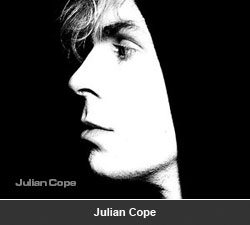 During our little hiatus, I've been spending some time listening to music and catching up with friends. I've recently (re-)discovered Julian Cope, who is more of a genius than I ever could have possibly realized.
During our little hiatus, I've been spending some time listening to music and catching up with friends. I've recently (re-)discovered Julian Cope, who is more of a genius than I ever could have possibly realized.Genius? Hell, the man is a prophet.
The liner notes to his 1991 masterpiece "Peggy Suicide" explain the songs while explaining nothing. Of his nearly-a-background-to-a-Levis-advertisement (already anticipating the commonplace song licensing of today) "East Easy Rider", he writes:
Seems to me that the wheel's gonna kill us. You spend your life being sold on the idea of freedom and the open road, 2-lane flat-top, the driving movie, the open-topped sports car, the motorbike as phallic metaphor, the whole schmeer. Then we find out that pollution's going to kill us all...if we don't move...our children are going to take a look at the world that we've left them and they're going to kill us in our sleep.Way ahead of his time. And the song sounds great. And it's groovy. And catchy.
Cope can write fantastic pop songs with the best of them, even in the middle of bad production (either excessive or too minimal - see "Charlotte Anne" and "Out of My Mind on Dope and Speed") He can also rock and blow your mind like Iggy Pop or Captain Beefheart or you name it.
He's also a distinguished scholar who speaks Russian and isn't just passionate about music, he's also learned.
It turns out he has a blog where he reviews records. Here's a bit from a review of a 12-minute long Alice Cooper bootleg, arguing that Alice Cooper is better than Captain Beefheart:
...at least the Coop’s first two LPs sounded like the Beatles in a liquidiser – Lick My Decals Off sounded like fucking Henry Cow jamming late period Pere Ubu! Mercy!That's not just heresy to the elite rock crowd, it's a spot-on critique of much modern art.
It’s just that Alice Cooper became a Hollywood golf no-mark while Captain Beefheart became a holier-than-thou sepia print by Anton Corbijn. Alice may have become arena dross, but Beefheart opted out of music altogether. And, in my book, choosing the art gallery scene over the arena rock scene is a far bigger crime against humanity. But then, my love of music is such that, for me, even T’Pau, Living in a Box, and the Jools Holland Big Band together doing reggae versions of the Macarena comes closer to approaching the divine that the passive drywank snorathons of meaninglessness spewed-up by the I’ve-got-my-personal- neuroses-and-I’m-not-afraid-to-use-them brigade of Tate modern masters.
And here he is on Van Halen:
The great thing about this ATOMIC PUNKS LP was always the way the rhythm guitar dropped out when the solos came in, leaving the mogadon bass of Michael Anthony as sole supporter of the song’s chord sequence, thereby rendering Edward Van Halen’s shards-of-shattering-Red Arrows-windscreen guitar aerobatics less Olympian and more Lokian. To be fair, much of the first studio LP did just this and gained hugely from the Cast Adrift element of chaos that it brung to the party. But as an antidote to the parts that got rhythm guitar support (and the second LP certainly fell a major victim), this ATOMIC PUNKS bootleg really reveals what a freeform racket they could brew up. Man, those amazingly confident harmony vocals sound even greater when you’ve lost all sense of their context.His reviews have footnotes, people. Footnotes! Why isn't he reviewing every record ever written? This is a man you can have a beverage and a conversation with!
He's totally nuts, too. But what would you expect? He stopped making records people actually liked around 1997, and immediately started making interesting music thereafter.
Julian, I salute you and I look forward to our inevitable collaboration!